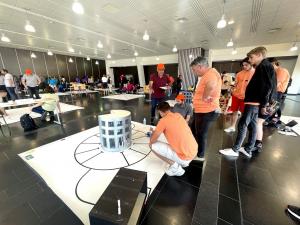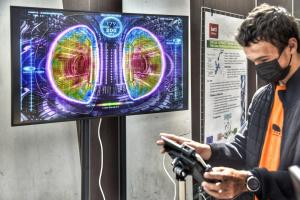Cultivating curiosity and creativity
More than 450 people—students, teachers and professionals—took part in the 11th edition to learn about robots and technology. The student teams had each built a small robot to simulate a maintenance situation inside the future ITER Tokamak machine—namely the remote handling of components that need replacement or refurbishment. In addition to the competitive events throughout the day, all the visitors enjoyed karaoke, dance and, surprisingly, the presence of two giant robots proposed by Lumynight Animations.
"For me, honestly in my heart, you have all won," said Litaudon. "Why? Because you have learned so many things and learning is delightful, and also you have learned how to learn."



